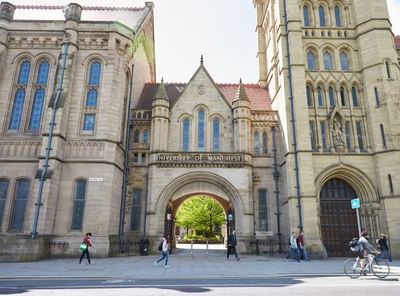Study in United Kingdom
The UK has always been a top choice for students who want more than just a degree. It’s where innovation meets tradition, and the world's leading universities open doors to unmatched career opportunities. When you study in the UK as an international student, you get to experience world-class education, gain invaluable global exposure, and connect with a diverse student community.
If you're considering studying abroad in the UK, you're investing in your future. The UK uniquely combines academic rigor, cutting-edge research, and real-world applications. It’s an environment where you’ll challenge yourself, grow, and prepare to make a real impact in your field.
Quick Insights About Studying in the UK
|
No of Universities |
200+ |
|
Universities Ranked in QS 2025 |
90 |
|
International Students |
~679,970 |
|
Number of Intakes |
2 - 3 |
|
Average Annual Tuition Fees |
£9,000 - £38,000 |
|
Minimum IELTS Requirement |
6.0 – 7.0 |
|
Part-Time Working Hours |
20 hours per week |
|
Post-Study Work Visa Validity |
2 years |
Top Reasons Why You Should Study in the UK
If you're considering to study in the UK, you’re choosing a destination that blends academic excellence with diverse opportunities. The UK offers world-class education and a student-friendly environment that is hard to match.
- Globally Recognised Universities
The UK is home to some of the most prestigious institutions globally. Four universities, including the University of Cambridge, University of Oxford, Imperial College London, and University College London, are ranked in the QS World University Rankings 2025 top 10. Studying in the UK opens doors to high-quality education and global recognition.
- Diverse Course Options Across Industries
UK universities offer over 50,000 courses across more than 25 subject areas, giving you the chance to specialise early in your field. Whether you're looking for engineering, business, medicine, or even creative arts, there’s something for everyone. The top courses to study in the UK are designed to equip you with both knowledge and practical skills that will set you apart in the job market.
- A Student Hub with a Thriving Culture
London has consistently ranked as the top student city for three years running (2023, 2024, and 2025), and the UK continues to attract a growing number of international students. Its diverse culture, vibrant student communities, and rich history make it a welcoming place to study and live.
- World-Class Education & Cutting-Edge Research
The UK's education system ranks second best in the world. With over 82% of research being rated as "world-leading" or "internationally excellent" by the Research Excellence Framework, studying in the UK means you’re at the cutting edge of global research and innovation.
- Fast-Track Degrees to Save Time & Money
One of the biggest advantages of studying in the UK is the shorter duration of degrees. Most undergraduate programs take just three years to complete, while postgraduate degrees typically take one year—saving you time and money while still offering a high-quality education.
- Generous Scholarships for International Students
The UK offers numerous scholarships to study in the UK, such as the Chevening Scholarships, Commonwealth Scholarships, GREAT Scholarships, and Charles Wallace India Trust Scholarships. These scholarships help make studying abroad in the UK more affordable.
- Part-Time Work Opportunities
As an international student, you can work up to 20 hours per week during term time and full-time during holidays. This gives you the chance to gain work experience, support yourself financially, and develop valuable skills in the UK job market.
Understanding the UK Education System
The UK education system is renowned for its quality and offers a diverse range of programs for international students.
Types of Degrees
- Undergraduate Degrees: Typically take 3 years.
- Postgraduate Courses: Range from 1 to 2 years.
- Research Degrees: Available for those looking to pursue advanced study.
For Indian students, studying in the UK means joining a diverse academic environment. UK universities for international students provide strong support through academic guidance, resources, and a collaborative atmosphere.
Top Courses to Study in the UK
The UK is home to some of the best courses for international students, offering a world-class education across a variety of disciplines. Whether you're interested in traditional subjects or cutting-edge fields, studying in the UK gives you access to top-tier programs that combine academic excellence with practical exposure.
|
Academic Discipline |
Top Courses in the UK |
Description |
|
Business and Administrative Studies |
Economics Finance & Accountancy Business & Management Studies |
Develop a solid understanding of business, economics, and financial management to prepare for leadership roles. |
|
Engineering, Technology, and Mathematics |
Computer Science Mathematics Civil Engineering Electrical and Electronic Engineering Mechanical Engineering Chemical Engineering |
Focus on solving real-world problems using technology, engineering, and mathematical models with hands-on experience. |
|
Humanities |
History Languages Philosophy |
Explore human history, cultures, and philosophical concepts, honing critical thinking and communication skills. |
|
Natural Science |
Biology Physics Chemistry |
Study the natural world, gaining analytical skills in biology, physics, and chemistry for scientific discovery. |
|
Social Science |
Sociology Law Politics Education |
Understand societal issues, governance, and legal systems, preparing for roles in law, public service, or education. |
|
Creative Arts |
Art and Design Media Performing Arts |
Foster creativity in visual arts, media, and performance, preparing for careers in design, media production, and entertainment. |
Highest Paying Degrees in the UK
The UK is home to a thriving job market, and its universities offer some of the highest-paying degrees that can boost your career. Choosing the right program helps you open doors to lucrative career opportunities.
- MBA
The MBA is one of the most sought-after degrees globally. Focusing on leadership, strategy, and business management, it equips students with the skills needed for senior roles in top companies. Graduates enjoy high earning potential and global career opportunities.
- Executive MBA
The Executive MBA offers advanced knowledge in management, leadership, and entrepreneurship for experienced professionals. Designed for those already in the workforce, it opens doors to higher executive positions and offers substantial financial rewards.
- Masters in Finance
With the UK being a global financial hub, a Master's in Finance offers access to some of the highest-paying roles in finance, investment banking, and financial analysis. This degree prepares you for careers with top financial institutions offering impressive salaries.
- LLM
An LLM degree is highly valued in the legal profession. Whether you’re pursuing corporate law or international law, this advanced qualification can significantly enhance your earning potential and open doors to top law firms and multinational corporations.
- Doctorate
A Doctorate in engineering, science, or economics offers long-term career benefits. The UK is a hub for research and development, and a PhD can lead to high-paying roles in academia, research institutions, and private industry.
Intakes to study in the UK
The UK academic year is divided into three primary intakes, offering flexibility for students to start their studies at various points throughout the year.
- September/ October (Fall Intake)
Main Intake: This is the most popular intake and offers the widest range of courses across all disciplines. September or October start dates align with the traditional academic calendar, making it the ideal choice for most students.
Why Choose It: The Fall intake allows you to apply for a variety of degree programs and enjoy the full student experience, including social activities, university events, and more.
- January/ February (Winter Intake)
Secondary Intake: This intake offers fewer courses compared to the Fall intake but remains a strong option for students who missed the September start or prefer a later start date.
Why Choose It: The Winter intake still provides a great selection of programs, particularly for postgraduate students or those interested in courses with flexible start dates. It’s also a good opportunity for students looking to fast-track their study plans.
- May/ June (Summer Intake)
Limited Intake: This intake is typically for specialised programs or short-term courses. It offers fewer options but can be ideal for students pursuing specific career-focused or professional qualifications.
Why Choose It: If you're looking to focus on specialised skills or need a shorter program, this intake could be perfect. It’s also ideal for students who want to start their studies during the summer months.
Scholarships
Studying in the UK can be a life-changing experience, but the cost of education can be a significant concern for many. Fortunately, numerous scholarships in the UK for Indian students help ease this financial burden.
Types of Scholarships to Study in the UK
These UK scholarships are awarded based on academic merit, financial need, or specific fields of study, giving you access to top universities across the country without worrying about finances. Here are some of the most well-known scholarships available:
- Chevening Scholarship
Fully funded Master’s degree scholarships for future leaders.
Covers tuition, living expenses, flights, and visa fees.
- Commonwealth Scholarship and Fellowship
For postgraduate students from Commonwealth countries.
Fully covers tuition, travel, and living expenses.
- GREAT Scholarship
99 postgraduate scholarships across 36 UK universities.
13 scholarships for Indian students in 12 UK institutions.
- Charles Wallace India Trust Scholarships (CWIT)
For professionals in heritage conservation, arts, or humanities.
Supports early to mid-career professionals for study or research in the UK.
- Scotland Saltire Scholarships
Funded by the Scottish Government in collaboration with Scottish universities.
Covers creative industries, technology, medical sciences, and more.
Job Opportunities in the UK for International Students
The UK job market offers a wealth of opportunities for international students, with its strong economy and diverse industries. As the 5th largest economy in the world, the UK is an ideal destination for building a successful career. Studying in the UK not only provides you with world-class education but also opens doors to numerous job prospects across various sectors.
Popular Sectors With Job Opportunities In The UK
- Technology and Telecom: High demand for software developers, data scientists, and IT professionals.
- Insurance: Opportunities in underwriting, risk management, and claims analysis.
- Financial Services: Roles in banking, investment management, accounting, and financial analysis.
- Law: Legal professionals, paralegals, and corporate lawyers are always in demand.
- Apps, Web, and E-Commerce: Rapid growth in digital platforms, with jobs in app development, web design, and e-commerce management.
- Energy, Mining, Chemicals, and Environmental: Careers in sustainable energy, mining, and environmental protection.
- Pharmaceuticals & Biotech: Research, product development, and regulatory roles in a rapidly evolving industry.
- Consumer Goods: Marketing, sales, and supply chain management opportunities in leading global brands.
- Transportation and Logistics: Opportunities in logistics management, supply chain operations, and transportation planning.
- Consulting and Professional Services: Careers in management consulting, advisory roles, and business analysis.
- Retail and Trade: Retail management, marketing, and sales positions with top retailers and brands.
- Media and Communication: Opportunities in journalism, public relations, advertising, and digital media.
- Public Sector and Education: Roles in government, public administration, and education sectors.
- Service, Tourism, and Restaurants: Hospitality, tourism management, and service industry positions.
- Healthcare: Opportunities for medical professionals, healthcare administration, and support staff.
- Charity and Non-Profit: Jobs in the charity sector, working for NGOs and non-profit organisations.
- Sports, Culture, and Recreation: Careers in sports management, cultural organisations, and recreational services.
- Construction and Real Estate: Project management, architecture, civil engineering, and real estate roles.
Available Courses To Study
Courses in the United Kingdom are as versatile as the country itself. From Journalism to Business Administration and even entrepreneurship, every student can find their perfect and desired course - and pursue a career that leads them to happiness, eventually becoming a success. However, the best courses to study in the UK are based on the number of students opting for those programmes and the quality of education and success rate that follows suit.
Finances
Cost of Studying in The UK
One of the most important factors to consider when planning to study in the UK is the cost of education. Tuition fees in the UK vary depending on the type of program and the university or college you choose. Here's a breakdown of the average cost of education in the UK to help you estimate your financial investment.
|
UK Study Program |
Average Annual Fee (in Euros*) |
|
|
1 |
Bachelor’s Degree |
£11,400 - £38,000 |
|
2 |
Master’s Degree |
£9,000 - £30,000 |
|
3 |
Doctoral Degree |
£15,000 - £24,000 |
- Undergraduate Programs: Tuition fees for undergraduate courses typically range from £11,400 to £38,000 per year, with an average of around £22,200 annually. Fees vary depending on the university and course type.
- Postgraduate Programs: The fees for master’s Degrees range between £9,000 and £30,000 per year, with an average of £17,109. This includes a wide range of courses, from arts to business, engineering, and more.
- Doctoral Programs: Fees for Doctoral Degrees or Ph. Ds usually range from £15,000 to £24,000 annually, depending on the course and research focus.
Some specialised courses, particularly in fields like medicine, may cost more than £50,000 per year. These courses typically require more resources and have a higher cost of instruction.
Cost Of Living In the UK
When planning to study in the UK, understanding the cost of living is crucial for budgeting and managing your finances. The total cost can vary based on your location, lifestyle, and accommodation choices.
|
Expense Head |
In London |
In rest of the UK |
|
On-Campus Accommodation |
£848 |
£664 |
|
Off-Campus Accommodation |
£750 |
£554 |
|
Household Expenses (broadband, electricity, etc.) |
140 |
80 |
|
Groceries |
£155 |
£116 |
|
Socialising |
£150 |
£80 |
|
Public Travel |
£103 |
£54 |
|
Cell Phone Expenses |
£18 |
£18 |
- In London: The cost of living in London is higher, with estimated monthly expenses ranging from £1,300 to £1,400. This includes rent, groceries, travel, and social activities.
In the Rest of the UK: Outside London, the average monthly cost typically ranges between £900 and £1,300, depending on lifestyle choices and accommodation type.
Cost Of Studying In United Kingdom
Interest rates as low as 8.9% *
Avg. on-campus living expense £18,468
250K+
Students Assisted
800Cr+
Loan Amount Disbursed
5000+
Loans Sanctioned
Admission Process
Admission requirements vary based on the course and academic level. Here are the general requirements:
Academic Transcripts: Official records from previous studies
English Proficiency Test Scores: IELTS, TOEFL, or PTE, depending on the course.
Standardised Test Scores: SAT, GMAT, GRE (required for certain courses).
Personal Statement: UCAS personal statement for undergraduate applications.
Letters of Recommendation: Typically required for postgraduate and some undergraduate courses.
Resume/CV: For postgraduate and professional courses.
Portfolio: Required for creative courses like design or art.
Proof of Finances: Bank statements to show you can support yourself during your studies.
Medical and ID Proofs: Some courses may require medical clearance or identity verification.
Application Process for International Students
Undergraduate Programs: Apply through UCAS (Universities and Colleges Admissions Service). You'll need to select courses, submit your academic records, personal statement, and any other required documents.
Postgraduate Programs: Apply directly through each university's portal. Submit academic transcripts, recommendation letters, and, for some courses, a research proposal.
Documents Required to Study in the UK
Here’s a quick checklist of essential documents for your application:
- Academic Transcripts: From previous institutions.
- English Proficiency: IELTS/TOEFL scores.
- Personal Statement: Tailored to the course.
- Letters of Recommendation: From academic or professional sources.
- Passport Copy: A clear, valid passport.
- Visa Application: Required for the student visa process.
Financial Proof: Bank statements to show sufficient funds.
Visa Process and Requirements
The UK student visa process is an essential step for international students looking to study in the UK. Here's a streamlined guide on obtaining the Tier 4 (General) Student Visa and post-graduation work opportunities.
UK Student Visa (Tier 4)
Once you receive an acceptance letter from a UK university, you can begin your Tier 4 Student Visa application. Here’s what you need:
- Confirmation of Acceptance for Studies (CAS): Issued by your university upon admission.
- Proof of Financial Support: Demonstrate you can financially support yourself during your studies.
- Valid Passport: Must be current and valid for the duration of your stay.
- Visa Application Fee: Around £490.
- Healthcare Surcharge: £470 per year for access to the National Health Service (NHS).
Post Study Work Visa
The Graduate Route Visa allows students to stay and work in the UK for up to 2 years after completing a degree. Here’s what makes this visa appealing:
- No Employer Sponsorship Needed: You can work in any role related to your field of study, offering you flexibility.
- Transition to Skilled Worker Visas: If you find a full-time job during this period, you can switch to a skilled worker visa and work long-term in the UK.
This visa gives you the freedom to gain valuable work experience in the UK after graduation, further enhancing your career prospects.
Permanent Residence (PR)
For Indian nationals seeking to settle in the UK permanently, the Indefinite Leave to Remain (ILR) is the first step. Here’s how you can work towards PR and eventually UK citizenship:
- Eligibility for ILR: You must live and work in the UK for at least 5 years on a work visa or through family ties.
- Applying for Citizenship: After holding ILR for 12 months, you can apply for British citizenship.
















